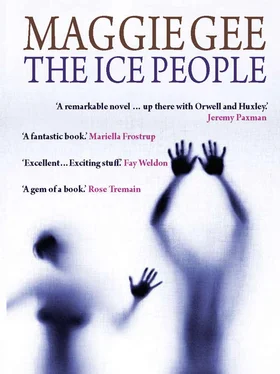Maggie Gee - The Ice People
Здесь есть возможность читать онлайн «Maggie Gee - The Ice People» весь текст электронной книги совершенно бесплатно (целиком полную версию без сокращений). В некоторых случаях можно слушать аудио, скачать через торрент в формате fb2 и присутствует краткое содержание. Год выпуска: 2008, Издательство: Telegram Books, Жанр: Фантастика и фэнтези, на английском языке. Описание произведения, (предисловие) а так же отзывы посетителей доступны на портале библиотеки ЛибКат.
- Название:The Ice People
- Автор:
- Издательство:Telegram Books
- Жанр:
- Год:2008
- ISBN:нет данных
- Рейтинг книги:4 / 5. Голосов: 1
-
Избранное:Добавить в избранное
- Отзывы:
-
Ваша оценка:
- 80
- 1
- 2
- 3
- 4
- 5
The Ice People: краткое содержание, описание и аннотация
Предлагаем к чтению аннотацию, описание, краткое содержание или предисловие (зависит от того, что написал сам автор книги «The Ice People»). Если вы не нашли необходимую информацию о книге — напишите в комментариях, мы постараемся отыскать её.
imagines an ice age enveloping the Northern Hemisphere. It is Africa’s relative warmth that offers a last hope to northerly survivors. As relationships between men and women break down, the novel charts one man’s struggle to save his alienated son and bring him to the south and to salvation.
Maggie Gee
The White Family
The Flood
The Ice People — читать онлайн бесплатно полную книгу (весь текст) целиком
Ниже представлен текст книги, разбитый по страницам. Система сохранения места последней прочитанной страницы, позволяет с удобством читать онлайн бесплатно книгу «The Ice People», без необходимости каждый раз заново искать на чём Вы остановились. Поставьте закладку, и сможете в любой момент перейти на страницу, на которой закончили чтение.
Интервал:
Закладка:
By night I sleep like a nervous cat, waking whenever a shadow moves. That’s when it will happen, one icy night when the dark makes me indistinguishable from any other skinful of meat and grease that would make the fires blaze up for a minute, keep a few starving kids alive.
… One night after the lights have gone out. One night when Kit isn’t there to protect me. He does protect me, in a way, though he might be rough with me if I’d let him. He is my friend, I suppose, in a way.
His foot prods me in the small of the back. ‘Get up, Gramp,’ he giggles. ‘Here —’ He hands me a can of hot water. The edge is raw metal. I drink with care. I don’t look at him until I’ve finished. It’s difficult to unlock my neck, to make the effort of looking up. His skin is a windreddened dirty brown, and the one empty eyesocket puckers like an arsehole, but he smiles cheerily, through yellow teeth.
‘Writing,’ he says, impatiently. ‘Finish?’
I gesture feebly at my notebook. ‘Just started.’
He points to the book, then his eyes, then back, then pulls a face of animal displeasure. ‘Reddit,’ he mouths. ‘Yerrch.’
‘I know, all right, but it gets —’
‘Nope.’ He mimes tearing my book apart. One of the pages does tear, slightly.
‘I’m going to write about the Doves, right. The Doves, get me? You like the Doves.’
‘Dying,’ he says, and crouches down beside me and stares at the floor. ‘The Doves, dying.’ Kit is actually crying.
‘No no,’ I say, encouragingly. ‘They just miss me. Their Uncle Solly. I’ve been too busy —’ His foot again, propelling me in the direction of the hangar where the Doves are kept.
‘You go today,’ I say, firmly. ‘I go tomorrow. Today, I write.’
To my surprise, he goes off, hangdog. I didn’t expect that to be so easy. Normally I don’t write by day, but the last two days I have found a hiding place and written as if it would save my life, though I don’t suppose anything can save me. I mean to finish my story, though.
I jog away, stiffly, trying to look young, trying to look tough and in command. I defecate in one of the pits. Hard and mingy, not satisfying. It’s the diet. Unless the boys have robbed a convoy there’s no fruit or veg except potatoes, which these kids can just about manage to grow, but most of them are rotten by this time of year and they come out of the fire either burnt or half raw. At least the cold stops the pits stinking. On the rare warm days, in the old midsummer, the air is suddenly black with flies. Not all the wild boys use the pits, but it’s a crime if you’re caught fouling, punishable with beating, and occasionally death, because some of the beaters don’t know when to stop.
The Doves are supposed to be my daytime job, but for a few days I’m going to neglect them. Kit will cover for me, with some of the boys. They always like to play with the Doves, though play is becoming less satisfying as more of the Doves become … moribund.
(Such a comic word, round as a plum. Not one of these boys would recognise it. I long for someone who knows what words mean. My mother loved them; my father too. In the new Days, people don’t risk words. If you open your mouth, the ice blows in, hurting the teeth no dentists care for. Drying your throat. Piercing your soul. Filling your heart with loneliness. Best keep the old words close to your chest … They don’t hurt me if I write them down.)
I jog purposefully over to the derelict shell that was once one of the multistorey carparks. Till a few months ago it was full of wild children shooting down the slopes on homemade skates and skateboards, but too many were killed, or it grew too cold. The winds that howled through became too much to bear, and now the skaters have moved elsewhere. There’s a tiny cupboard here, two metres square, smelling of damp, by an empty liftshaft. There is light to see by if I leave the door ajar, but it would be too dangerous to do that. I’m safe in the open, where many people know me, but no one’s safe if they’re caught alone. I close the door firmly and take out my candle, my treasured grey stump of life and light. Not much of it left, so I’ll have to hurry.
I never stopped loving that bloody woman, however angry I felt with her. Of course I was angry; she was insane. How could we get married and live apart? Shouldn’t a woman want to live with her man? She lived with a woman, and had a male lover.
I complained to anyone who’d listen. But people didn’t understand. It seemed I’d been living in a timewarp.
I tried to take in what was going on. Behind my back, the world had been changing. Once I started looking, it was everywhere. Segging had spread into so much of life. Young women were beginning to live with women; men were trying to live with men. Colonies of men took apartment blocks together. Those with swimming pools were especially popular. For many the choice was homosexual, but others just liked the camaraderie, which made them less lonely than before. This way of living could get competitive, vying with peers for sex or friendship or leadership within the group, so some of those early experiments failed and the men went back to live with their parents. The older generation thought the world had gone mad. Perhaps it had, perhaps it had.
The women lived together for different reasons. Some of them drew up the battlelines around the scarce, precious children. Four or five women would look after one child. Those rare, petted, unhealthy children … Again this could get competititive, but the childless ones found a kind of fulfilment. Not that all women were domestically inclined. The gangs of girls who roamed the towers were said to be more violent than the men. Some teenage girls found inspiration in older women’s groups which mimicked the men’s. Their ‘sheroes’ were hard, fighting fit: musclebuilders, shaved bulldykes who rode big motorbikes and had big arms. Men looked, and giggled, and looked again, and invented new subgenres of sex magazines in which such women were humiliated, or humiliated us, according to taste. But secretly we were afraid. I was afraid. Was this the future?
It reminded me of life in the Gendersense programmes that Sarah had fronted on the screens, which had always struck me as too weird to be true. I must unconsciously still have thought the norm was a home like Samuel and Milly’s, or mine and Sarah’s, as it once was.
I had known a lot of vaguely sympathetic couples who were trying for babies when Sarah and I were, clinging together like drowning people. Now, in my loneliness, I contacted them. But the ‘friends’ we had made in Dr Zeuss’s waiting-room — to be precise, that Sarah had made — had mostly split up since they’d been through the Batteries, whether the treatment were successful or not. Or else, to my surprise, they had never lived together. Some of them barely remembered each other …
They had all moved on, but I had not.
It took me some while to take this all in. I confided in Riswan, my friend at work. ‘Sarah has left me. And taken the baby. I only see him a few times a week.’
‘What do you mean, she’s left you?’ Riswan’s big dark eyes were opaque and puzzled.
‘For good. She only comes back to visit.’
‘You mean, you were living in the same flat?’
‘Of course. We’ve been together for over ten years.’
‘You should be glad, my friend, to be free of the woman! Women and babies make a mess everywhere —’
‘Well, she did do most of the cleaning —’
‘Men should stick with their own kind, actually. No trouble that way. No shouting, no crying. Tell this woman not to visit.’
He was the third person to react this way. I couldn’t deny there’d been some shouting and crying. ‘But I love my son,’ I said, puzzled, and saw the envy in Riswan’s eyes.
Читать дальшеИнтервал:
Закладка:
Похожие книги на «The Ice People»
Представляем Вашему вниманию похожие книги на «The Ice People» списком для выбора. Мы отобрали схожую по названию и смыслу литературу в надежде предоставить читателям больше вариантов отыскать новые, интересные, ещё непрочитанные произведения.
Обсуждение, отзывы о книге «The Ice People» и просто собственные мнения читателей. Оставьте ваши комментарии, напишите, что Вы думаете о произведении, его смысле или главных героях. Укажите что конкретно понравилось, а что нет, и почему Вы так считаете.












